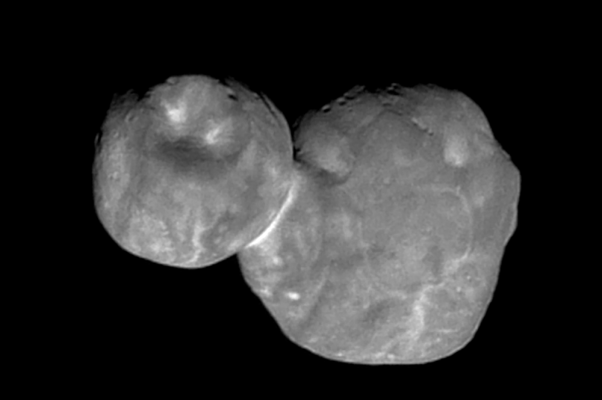The rendezvous between the New Horizons probe and the distant object known as Ultima Thule was an historic moment, but after the mind-blowing imagery the craft sent back from Pluto, you could be forgiven for being a little disappointed in how indistinct the early imagery was. Those concerns should be partly alleviated by the latest image from the probe, which shows the rocky world in considerably greater detail.
It’s still not exactly poster quality, but remember, this is being beamed back bit by bit from four billion miles away. And it isn’t just sending the best stuff, but a huge series of images it took during the brief flyby on January 1. Not only that, but there are multiple imagers and instruments whose information must be collated and adjusted for human viewing.
In this case, the image was taken by the Multicolor Visible Imaging Camera, or MVIC; the previous ones were taken with LORRI, a long-range reconnaissance camera. It was taken from a distance of about 4,200 miles away, just minutes before the probe’s closest approach.
The lighting is fortuitous, and helps show off the topography of Ultima Thule, or 2014 MU69, as it was previously known. To give you a sense of scale, the big concavity in what you might call the head of the snowman is about 4 miles across. The team writes in a blog post:
Not clear is whether these pits are impact craters or features resulting from other processes, such as “collapse pits” or the ancient venting of volatile materials.
Both lobes also show many intriguing light and dark patterns of unknown origin, which may reveal clues about how this body was assembled during the formation of the solar system 4.5 billion years ago. One of the most striking of these is the bright “collar” separating the two lobes.
Principal Investigator of the New Horizons mission Alan Stern, with whom I spoke about the flyby and other topics some months before New Year’s, says in the same post that we have even more to look forward to:
“This new image is starting to reveal differences in the geologic character of the two lobes of Ultima Thule, and is presenting us with new mysteries as well. Over the next month there will be better color and better resolution images that we hope will help unravel the many mysteries of Ultima Thule.”

